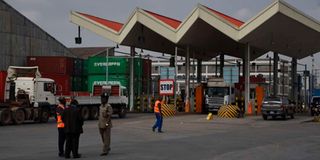Joho firm to handle cargo destined for South Sudan

The Nairobi Inland Container Depot. The family of Mombasa Governor Ali Hassan Joho has won a lucrative deal to handle all South Sudan imports at its Nairobi Freight Terminal.
The family of Mombasa Governor Ali Hassan Joho has won a lucrative deal to handle all South Sudan imports at its Nairobi Freight Terminal (NFT).
It is a policy shift that will see Coast-based cargo transporters and clearing agents lose out on a business they have controlled for decades.
Six clearing agents have been appointed to handle goods destined for South Sudan at Nairobi Inland Container Depot, indicating all imports will be directly loaded and transported on the standard gauge railway (SGR) upon offloading in Mombasa.
“Following the appointment of NFT as the sole firm to manage South Sudan cargo and subsequent evacuation to South Sudan, the National Revenue Authority (SSNRA) Division of Customs does hereby confirm that the following agents have been authorised to clear South Sudan cargo from NFT,” states SSNRA Customs Commissioner Akol Madut in a letter to Ms Lilian Nyawanda, the Kenya Revenue Authority (KRA) Commissioner for Customs and Border Control.
The company won the tender competitively, owing to its location next to the Nairobi Inland Container Depot, which is connected to the SGR.
Clear cargo in Nairobi
Kenya and South Sudan agreed to clear cargo destined to Juba in Nairobi from this month.
Mombasa-based transport and clearing and forwarding companies will be the biggest losers as they will be cut off from the business of handling more than 1.1 million tonnes of cargo destined for South Sudan that passes through coastal port every year.
“The directive will lead to loss of business. We may be made to move to Nairobi to clear the cargo,” Kenya International Freight and Warehousing Association chairman Roy Mwanthi said.
South Sudan is second after Uganda in the use of Mombasa port, accounting for 9.9 per cent of transit volumes.
Lion’s share
Uganda accounts for the lion’s share of 83.2 per cent while the Democratic Republic of Congo, Tanzania and Rwanda account for 7.2, 3.2 and 2.4 per cent, respectively.
The six authorised agents will clear and handle cargo ferried on rail and trucks.
“The firms allowed by KRA to clear South Sudan cargo are Safina Merci Co Ltd, Met-Connection International Company, Nimbus Company, Safinass Company, Le Comex Afrique and Manzil Developers,” the letter signed by Dr Madut reads.
Different companies have been handling South Sudan cargo, but there have been complaints of inefficiency.
That made the government in South Sudan to change agents and lately pick NFT as its only cargo handler.
Companies that have been handling South Sudan goods include Compact CFS, Regional Logistics, Siginon Container Freight, Awanad CFS, Mitchell Cotts, Consol Base CFS, Asgher Moulu & Fernando Marquis and Makupa CFS.
Clearing agents protested in 2013 when Panda CF partnered with Compact Freight Station to handle 34 shipping lines docking at the port.
Increase SGR volumes
The new move means cargo that passes through the port of Mombasa destined for South Sudan will be cleared in Nairobi, thus increasing volumes to be ferried on the SGR.
In correspondence between Transport and Infrastructure Cabinet Secretary James Macharia and his South Sudan colleague, Dr Madut confirmed that Juba-destined cargo would be moved by rail from Mombasa to Nairobi for clearance.
It will in future be moved to the Naivasha ICD to reduce the distance covered by trucks from Mombasa to the South Sudan capital by about 500 kilometres.
“The decision by your government to use NFT is a clear expression of the confidence you have in our facility, which is served by the SGR. It is adequately equipped to handle containerised and conventional cargo to and from South Sudan,” Mr Macharia said in a March 10 letter.
“We acknowledge that South Sudan is a key partner state and we support every initiative aimed at expediting economic growth and development through enhanced efficient and cost-effective movement of freight. The request by your government is welcome. We would be glad to engage further to move cargo from Nairobi to Naivasha.”
Cut transport costs
As Mombasa-based transporters and clearing agents cry foul, the South Sudan business community said the request to clear cargo in Nairobi was based on the need to cut transport costs and reduce the number of days taken for imports to reach their country.
South Sudan International Freight and Warehousing Association Secretary General Adau Kuol Biong dismissed those opposed to the move, insisting cargo owners would be the greatest beneficiaries.
“We would like to appreciate the governments of Kenya and South Sudan for considering our proposal to pick transit cargo coming through the port of Mombasa instead of picking it at the coastal town following good infrastructural development provided along the railway line, especially the inland container storage facilities in Nairobi,” Mr Biong said.
He added that their request to directly get cargo from Nairobi is intended to reduce the cost, distance and congestion on the Mombasa-Nairobi highway.
“We would like to register progress made with the discounted charges for rail transport. This is coupled with incentives offered by the NFT, including longer stay of South Sudan goods at its facility without incurring charges,” he said in a letter addressed to the Kenyan government.





